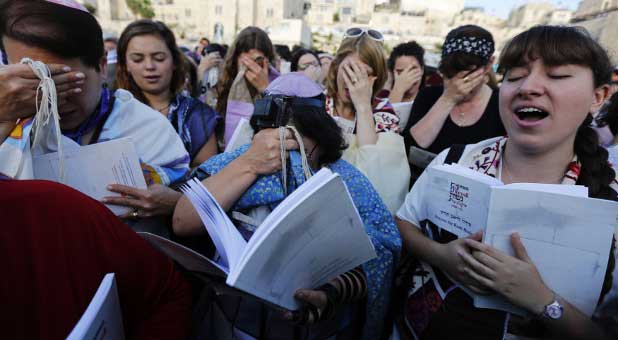Intra-religious tensions were at an all time high at the Western Wall plaza on Friday morning as thousands of haredim (ultra-Orthodox) faced off with a group of a few dozen women, seeking to conduct their monthly Rosh Chodesh (the beginning of a Jewish month) prayer at the holy site.
The Women of the Wall, who have been holding a monthly egalitarian prayer service at the Western Wall for 24 years, were joined by Meretz MKs Tamar Zandberg and Michal Rozin, and Likud MK Miri Regev. Many of the women wear prayer shawls and perform religious rituals typically reserved for men under Orthodox Judaism. Haredi leaders have accused the women of violating “local custom” at the holy site.
Thousands of haredi women and seminary girls, called to the site by Shas spiritual leader Rabbi Ovadia Yosef and bused in by haredi organizers, also arrived and took up positions inside the women’s section, ready to hold a mass prayer and eclipse the Women of the Wall’s presence in the women’s section. Thousands of young haredi men also accompanied the women to the Wall, ready to stage a demonstration.
Hundreds of police officers summoned to the scene tried to physically divide the Women of the Wall and the haredi worshippers, but to no avail. As soon as the prayer began, shortly before 7 a.m., some of the haredi worshippers began beating police officers, throwing garbage and plastic chairs at police and at the Women of the Wall, hurling cups of coffee and other objects and spraying them with water.
Three haredi men were arrested. The police said that they would examine photos of the incident and possibly make further arrests. Several haredi men called the police officers present “Nazis.”
Two police officers sustained light injuries and were treated on site.
Upon completing the service, the Women of the Wall were escorted by heavy security out of the compound. Their bus was pelted with stones, witnesses said. Jerusalem Police Commander Yossi Parienti said it was likely that more arrests would be made following police analysis of video from the violent protest. “It pains me to see the Western Wall become a battlefield,” Parienti said.
“It’s a historic moment,” said Shira Pruce, a spokeswoman for Women of the Wall. “The police did an amazing job protecting women and allowing them to pray freely at the Western Wall. This is justice.”
In the past, police have arrested members of the Women of the Wall several times on charges of violating a 2003 High Court ruling barring them from wearing prayer shawls and reading from the Torah at the Western Wall. Last month, however, the Jerusalem District Court ruled that the High Court decision did not render their actions illegal, and therefore they should be permitted to pray unimpeded.
As a one-time concession, the Women of the Wall complied with a request made by Economy and Trade Minister Naftali Bennett to “be considerate of the feelings of others at the Wall” and agreed to forgo reading from the Torah this Rosh Chodesh.
The Western Wall rabbi, Shmuel Rabinowitz, who has in the past called the women’s group a “provocation,” tried to ease tensions at the holy place. “No one in Israel wants a disagreement at the Western Wall,” Rabinowitz told Army Radio.
Israeli officials and lawmakers have been attempting to find a compromise that will satisfy both the women’s group and the ultra-Orthodox. They have proposed establishing a new section at the Western Wall where men and women can pray together. The proposal, if implemented, would be seen as a victory for the more liberal streams of Judaism, which have been battling to be granted recognition in Israel.
The Women of the Wall, in contrast, insist on their right to pray as they want in the existing women’s section.
It’s part of a wider culture clash that has triggered a backlash against Israel’s ultra-Orthodox community.
The ultra-Orthodox make up about 10 percent of Israel’s eight million citizens. For most of the last three decades, they have served in coalition governments securing vast budgets for religious schools and exemptions from mandatory military service for tens of thousands of young men in full-time religious studies.
For the original article, visit israelhayom.com.












